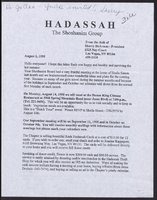Search the Special Collections and Archives Portal
Search Results

Jean Sherman McColl interview, March 1, 1977: transcript
Date
Description
On March 1, 1977, collector Sam C. Melchiome Jr. interviewed Jean McColl (born May 24th, 1931 in California) at her home in Las Vegas, Nevada. In this interview, Jean McColl discusses growing up in Searchlight and then Las Vegas, Nevada. She discusses how her family came here as well as the many changes she has seen through the decades living in Las Vegas, Nevada.
Text
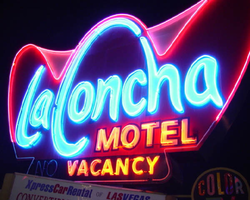
Photographs of La Concha sign, Las Vegas (Nev.), 2002
Date
Archival Collection
Description
Site address: 2955 S Las Vegas Blvd
Sign owner: Edward Doumani
Sign details: The La Concha is located north of the Riviera hotel Casino, just past the giant glass wall advertising for Splash. The La Concha double sided ground sign, sits close to the street on the east side of the strip, facing north /south. Directly to the east the origin of the signs shape resides in the form of the front structure of the La Concha's lobby structure. The sweeping elliptical roofline creates a structure dripping with the flavor of outlandish 50's-60's expressionistic modern design. The roadside ground sign reflects this shape actually mimicking it in a stylized silhouette of itself. The two icons are separated by a small but busy parking lot that expands north of the La Concha to house other similar style structures. The wings of the hotel, which extend out behind the main lobby, are a rather stark and plainly rectangular form, compared to the front portion of the lot.
Sign condition: Structure 4 Surface 4 Lighting 4 Notes: Considering the age of the property and the sign, it is in great condition, everything is intact, but not perfect.
Sign form: Pylon
Sign-specific description: The sign resides in a pleasant spot of green grass, among the concrete and black top surfaces. A rectangular base, painted a light hue of blue and gold, supports a double-sided sculpted cabinet in a three-pointed crown, which is the stylized profile of the building in sits in front of. Below the main cabinet a triangular internally lit message center has been added, as well as two more, flat rectangular cabinets on the north and south sides. The cabinets are adorned with text that advertising for car rentals located in the same neighboring lot. Off of the west side of the cabinet a small circular cabinet is cantilevered off of the edge. It is an internally lit marker, noting that color television is available inside. The surface of the actual cabinet is painted red, and is somewhat faded. The section of the cabinet that would be dedicated to the low-lying portions of the La Concha's roof are addressed in white. The "La Concha" is spelled across the front of the sign in white text outlined in blue. The text is designed specific to the sign, for the capital L and C are shaped to match the contours of the crowns of the sign. The rest of the script also takes on some of the same stroke of the manner. Motel is spelled in the same coloring across the bottom right hand portion of the signs face, in block text. The very bottom portion of the cabinet is a black painted horizontal extension with edges that angle back into the body of the sign. The words "vacancy' are written across the surface of the sign to the right hand side. No is spelled on the left, but only in neon. When illuminated the main text is lined with a light electric blue, while the edges, and the top contours are lined with a pink and fuchsia glowing borders. The words "vacancy" and "motel" are lined in an orange, amber colored, warm tubing.
Sign - type of display: Neon; Incandescent; Backlit
Sign - media: Steel; Plastic
Sign - non-neon treatments: Graphics; Paint
Sign animation: none
Sign environment: The La Concha sits just to the south of the Riviera's giant glass wall. Headed south, the property comes into view, being a quiet transition from the extreme nature of the Riviera. The sign sits in a black top expanse that meanders back into the rest of La Concha's property. The base of the sign is surrounded with plants and curbing, firmly rooted into the urban mainstream of the neighboring street.
Sign manufacturer: YESCO
Sign - thematic influences: The theme of the La Concha can be drawn directly from 1950's and 60's modern design. Such curve can be seen signs of the decade for example the original Dunes pylon displays elements of such curve and swell. In Jorg Rugemer's Lost Las Vegas, there is a picture of a 60's era automobile sitting next to the building. It is used to show the influences of the structures design present in the design of something as common as the automobile. It is reminiscent of the protruding fins and large eye like taillights seen on such autos. The sign itself is an interpretation of the building in a silhouette form, so it's angle draw from the same pool as well. The coloration of the neon is also reminiscent of the era. The turquoise, vermilion and red are reminders of such properties as the original Flamingo, and the Algiers.
Surveyor: Joshua Cannaday
Survey - date completed: 2002
Sign keywords: Pylon; Neon; Incandescent; Backlit; Steel; Plastic; Graphics; Paint
Mixed Content
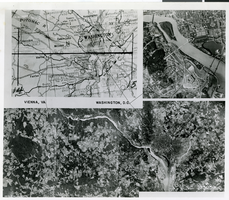
Aerial photograph of Potomac area, with map, demonstrating the Lockheed Shooting Star mapping plane, October 28, 1946
Date
Archival Collection
Description
Image
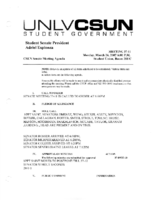
Meeting minutes for Consolidated Student Senate, University of Nevada, Las Vegas, March 26, 2007
Date
Archival Collection
Description
Text
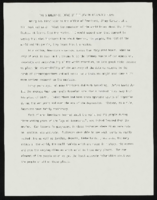
"The Stereotypic Image of the Jew in Hollywood Films": manuscript draft by Roosevelt Fitzgerald
Date
Archival Collection
Description
From the Roosevelt Fitzgerald Professional Papers (MS-01082) -- Unpublished manuscripts file.
Text
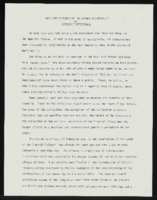
"Anti-Semitism/Racism: Is Either Acceptable?": article draft by Roosevelt Fitzgerald
Date
Archival Collection
Description
From the Roosevelt Fitzgerald Professional Papers (MS-01082) -- Drafts for the Las Vegas Sentinel Voice file. On the University of North Dakota receiving $5 million donation from Imperial Palace Hotel & Casino owner and approved Nazi war room artifacts.
Text
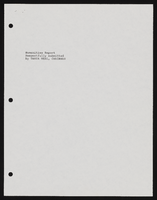
Alpha Kappa Alpha Sorority, Theta Theta Omega Chapter arts and humanities committee report
Date
Archival Collection
Description
From the Alpha Kappa Alpha Sorority, Incorporated, Theta Theta Omega Chapter Records (MS-01014) -- Chapter records file.
Text
Wayne Tanaka oral history interview
Identifier
Abstract
Oral history interview with Wayne Tanaka conducted by Ayrton Yamaguchi, Vanessa Concepcion, Kristel Peralta, Cecilia Winchell, and Stefani Evans on March 12, 2021 for Reflections: The Las Vegas Asian American and Pacific Islander Oral History Project.
Wayne shares his family's heritage and history as Japanese Hawaiians and discusses his father's internment during World War II. He shares his background growing up in Lahaina, Maui, Hawai'i and how he came to live in Las Vegas. Wayne discusses his career as an educator for the Clark County School District and talks about his life in Las Vegas with his wife and daughters.
Subjects discussed include: Las Vegas Buddhist Sangha; Executive Order 9066; Sunset High School; Boulder Dam Area Council
Archival Collection
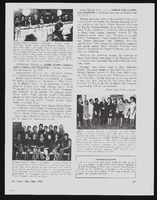
Alpha Kappa Alpha Sorority, Theta Theta Omega Chapter: Ivy Leaf newsletter articles
Date
Archival Collection
Description
From the Alpha Kappa Alpha Sorority, Incorporated, Theta Theta Omega Chapter Records (MS-01014) -- Chapter records file.
Text

